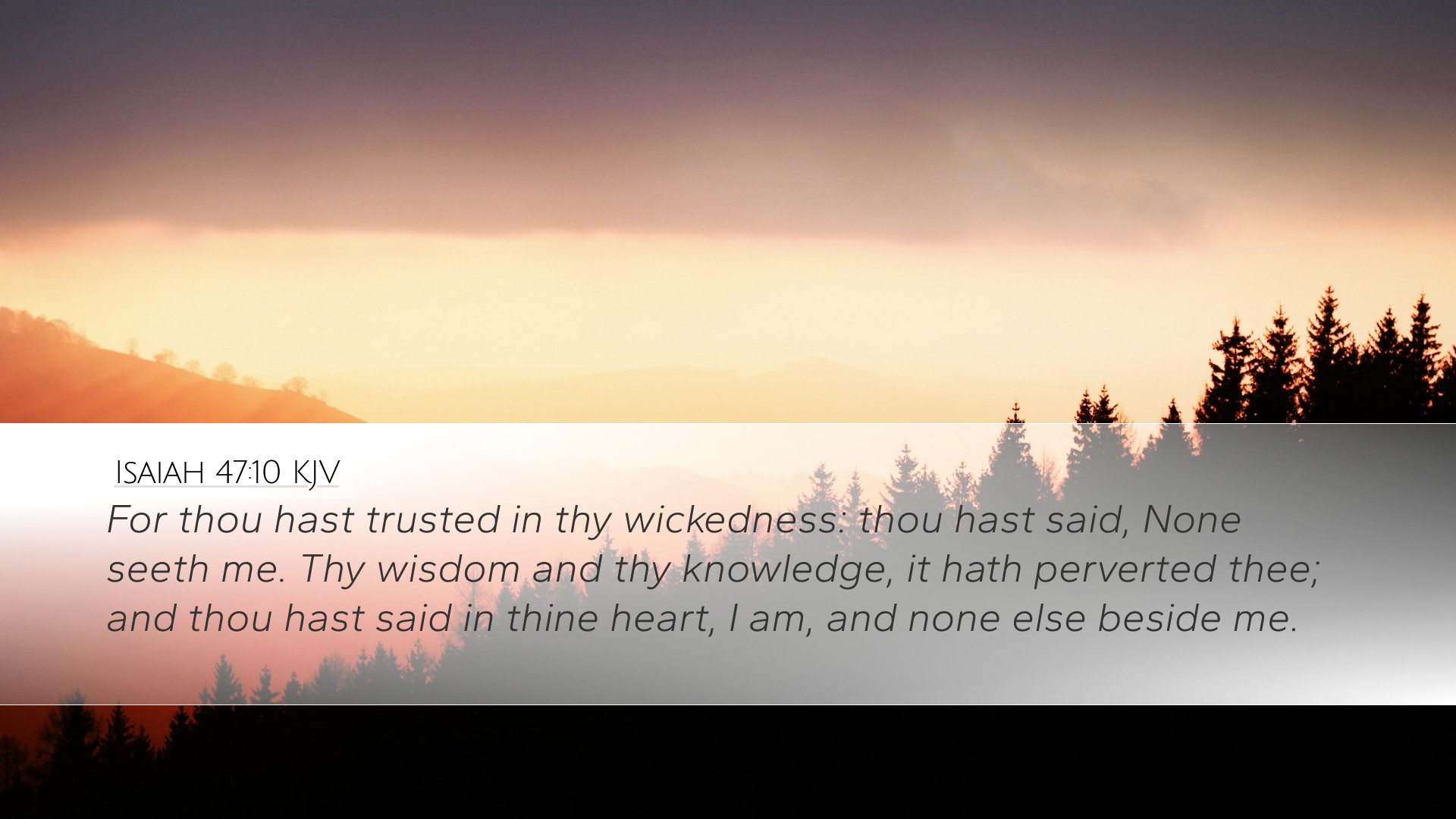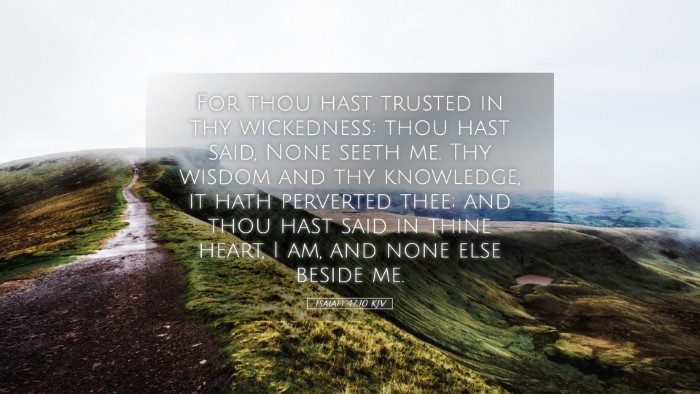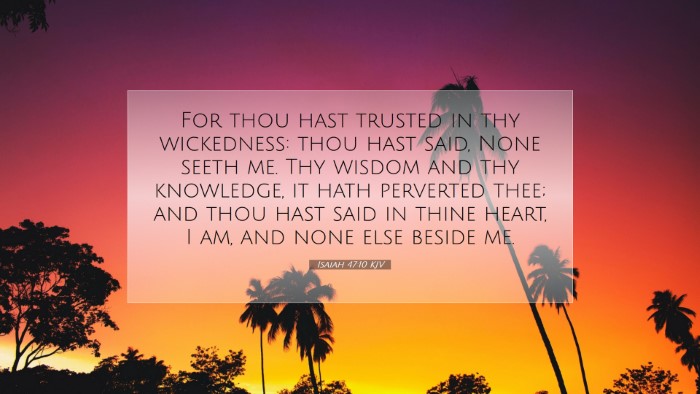Commentary on Isaiah 47:10
Isaiah 47:10: "For you have trusted in your wickedness; you have said, 'No one sees me.' Your wisdom and your knowledge have deceived you; and you have said in your heart, 'I am, and there is no one else besides me.'
Introduction
The passage from Isaiah 47:10 serves as a powerful indictment against Babylon, representing the heights of pride, self-reliance, and rejection of God. In the context of Isaiah, this verse draws a stark contrast between human wisdom and divine insight, illustrating the futility of placing trust in human institutions and capabilities over divine providence.
Contextual Analysis
This verse emerges from a larger section where God, through the prophet Isaiah, communicates judgment against Babylon—a symbol of human arrogance and defiance against divine authority. Babylon's self-confidence, symbolized by its belief in its wisdom and strength, is a central theme in this verse.
Historical Background
Babylon, a powerful kingdom during Isaiah's time, represents a civilization that thrived on military power and economic strength. The Israelites viewed Babylon with a mix of fear and contempt due to its oppressive nature. The context of judgment speaks to the inevitable downfall of those who oppose God's ways.
Thematic Insights
-
Wickedness and Trust:
Babylon’s trust in its wickedness reveals a deep-seated reliance on practices that are contrary to God’s ordinances. As noted by Matthew Henry, “Their sin was great; instead of having their trust in God, they leaned upon their vices.” This points to a broader biblical theme where reliance on anything other than God leads to moral and spiritual decay.
-
Illusion of Secrecy:
The phrase 'No one sees me' captures a false sense of security. Albert Barnes suggests, “They thought their crimes were hidden from the view of God.” This illustrates humanity's tendency to believe that God overlooks sin, an error that leads to complacency and inevitable judgment.
-
Deception of Wisdom:
Babylon's reliance on its wisdom and knowledge is portrayed as deceptive. Adam Clarke emphasizes that “What men consider wisdom can often serve as their undoing.” The knowledge they relied on was not divinely inspired, and hence it contributed to their downfall, reflecting the Apostle Paul's later sentiments about worldly wisdom (1 Corinthians 1:19).
-
Assertion of Sovereignty:
The claim 'I am, and there is no one else besides me' exhibits the ultimate arrogance of Babylon, akin to divine pride. Matthew Henry further remarks that it's a direct contradiction to God’s nature. God's ultimate sovereignty is regularly reaffirmed throughout Scripture as a reminder of humanity’s limited capacity and need for divine guidance.
Theological Reflections
The implications of Isaiah 47:10 stretch beyond its immediate historical audience to address contemporary believers. The principles of pride and self-reliance are ever-relevant, reminding readers that:
- The Danger of Humanism: In modern contexts, the human tendency to trust in human wisdom over God's word is prevalent. This verse warns against the hubris of self-sufficiency that underestimates God’s omnipotence.
- Call to Humility: The acknowledgment of God’s sovereignty leads to humility. As Jesus taught, “Blessed are the meek” (Matthew 5:5), believers are called to recognize their dependence on God rather than their abilities.
- Judgment and Hope: While the judgment against Babylon is stark, it also serves as a hope-filled reminder that God rules justly and will ultimately triumph over evil. For the faithful, trusting in God leads to salvation, while for the unrepentant, it reflects impending judgment.
Practical Applications
This verse beckons every believer to evaluate their trust and reliance in daily life:
- Guard Against Pride: The first step in application is recognizing the areas where pride may influence one's decisions and actions.
- Seek Divine Wisdom: As Scripture commands believers to seek wisdom from above (James 1:5), cultivating a habit of prayer and continual reliance on God’s word is crucial.
- Transparency in Life: Embrace the truth that God sees all and foster a life lived openly before God, allowing His light to expose any hidden sin.
- Encourage Others: As leaders, pastors, or mentors, encourage others to put their trust in God rather than in the fleeting wisdom of the world.
Conclusion
Isaiah 47:10 stands as a solemn reminder of the inherent danger of self-reliance and pride. Through the study of this passage, believers are urged to abandon the illusions of wisdom that separate them from God and to embrace the truth that He alone is sovereign. As history reflects God’s justice against prideful nations, it equally invites individuals to a posture of humility, repentance, and faith before the almighty God.


